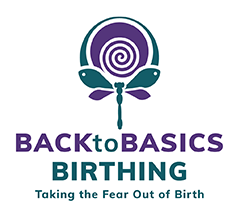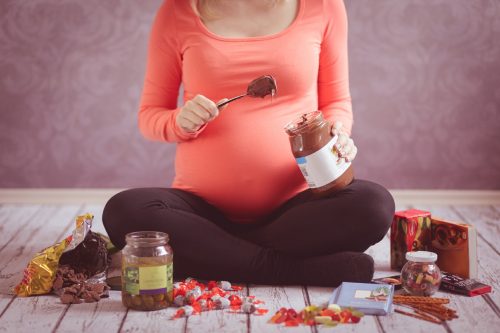Contact Vicki
If you have any questions or would just like more information please don't hesitate to get in touch by clicking the button below and filling out the contact form.
Contact Vicki

Many hospitals still have a policy of no eating during labour in case you have to go for surgery.
Like so many of these hospital policies this is now outdated information and is based on work by Dr. Mendelson in the 1940s that indicated that under “general anaesthesia” there was a possibility of acidic stomach contents entering the lungs and causing damage. Back in those days obviously the drugs and equipment were nothing like what we have today and were not as safe.
Recent studies have now shown that it is important for women to eat and drink regularly during labour to ensure that they maintain their blood sugar levels and energy.
Even the American Society of Anaesthesiologists did a press release in 2015, which states that labouring women would benefit from having a light meal during labour:
CLICK HERE TO READ PRESS RELEASE
“Since the evidence shows no benefits or harms, there is no justification for the restriction of fluids and food in labour for women at low risk of complications. No studies looked specifically at women at increased risk of complications, hence there is no evidence to support restrictions in this group of women. Conflicting evidence on carbohydrate solutions means further studies are needed and it is critical in any future studies to assess women’s views.”
CLICK HERE TO ACCESS THE REVIEW
Ketosis is a natural response to your body being subjected to prolonged physical activity, such as labour, without replenishing your energy stores by eating or staying hydrated.
The effect of ketosis on mother and baby is not clear; however it is known that it does cross the placenta and baby may have acidic blood and increased lactate levels. This condition can also cause mothers to feel nauseas, you may start vomiting, get headaches and it can make you more exhausted.
It is known that ketosis can cause labour to slow down and stall, and has been linked to difficulty in establishing breastfeeding.
The best foods to eat during early labour are carbohydrates like grains and pasta as they give you a slow release of energy.
Simple carbohydrates during active labour such as fruit, juices (non-acidic) and honey will give you a quick burst of energy.
Sugary foods are less ideal as they may give you an immediate boost in energy but fade quickly making you feel worse.
A teaspoon of honey can also really help to control ketosis so make sure you take some honey with you in your food bag.
It is much more beneficial to eat small portions of energy foods regularly rather than trying to eat a full meal, and I am not suggesting you order a pizza and try and scoff that down in between your surges.
When you are in active labour you may not want to eat too much at all, so liquids are a lot easier to get down, and smoothies are a great way to get some fruit (particularly bananas) and protein into your body.
It is recommended that you try and eat a small amount of something every hour – maybe a handful of nuts, or a protein ball.
You can have smoothies ready made in shaker containers and store in a small esky or cooler box. Just shake them well and they will be ideal to have during labour.
Coconut water is a must have as it contains electrolytes and is perfect for hydration and energy. It is an acquired taste though so you may need to start drinking it in the later stages of your pregnancy to get used to the flavour.
If you don’t like coconut water you could try the isotonic drinks with electrolytes, however coconut water has been found to cause less nausea, fullness and upset stomach.
At the end of the day there is no right or wrong list of foods – eat whatever you feel like eating because any food and drink is better than nothing at all.
I had a client who was in active labour and her Obstetrician walked in to find her scoffing down some lasagna that she had packed from her left over dinner the night before.
Remember to keep sipping water from a straw and going to the toilet regularly to have a wee, so that your bladder doesn’t stay full and inhibit baby from moving further down.
If your care providers have a “no eating or drinking” policy at their hospital you need to discuss this early on at your appointments and provide them with evidence that their policies are outdated.
Remember – policies are based on guidelines and if the hospitals do not keep up to date with the current guidelines, then their policies are outdated.
Being a self-confessed chocoholic, I love this bit and so will you.
Research has now shown that chocolate is beneficial in releasing endorphins, and induces positive effects on the mood while reducing emotional stress. To be more science based, it is not just any chocolate, it is the cocoa powder used in dark chocolate, particularly if it is the raw cacao powder at 70% or higher, but if you don’t like dark chocolate, then you probably wont enjoy it and then you are in the neocortex part of your brain thinking “Vicki, this chocolate tastes like crap…..” so not really helping to reduce emotional stress.
The problem is, the more milk you add to cocoa, the less beneficial it is in helping to release endorphins.
I don’t suggest you sit there and eat a whole block of chocolate, but find some good quality chocolate that you absolutely adore, and break it into small pieces, put the pieces into a container and then once every hour or two pop a little piece of that chocolate into your mouth and just suck on it till it dissolves.
Focus on the feel of the chocolate on your tongue and really savour the flavour.
Make up some bone broth before your estimated due date and have it ready in the freezer and then defrost when you are in early labour. Once defrosted you can heat it up and put into a thermos to take with you to the hospital or just heat it up in the hospital kitchen. Sip throughout labour to help replace electrolytes and give you sustenance during your birth, particularly when you don’t feel like eating anything.
As a doula I make up bone broth (or vegetable broth for vegetarians and vegans) and take it with me in a thermos for my clients.
Here is a “suggested” list of foods and drinks to pack in your bag:
Evidence Based Birth
https://evidencebasedbirth.com/evidence-eating-drinking-labor/
Here are the results in the British Medical Journey (BMJ) for the research conducted:
http://www.bmj.com/content/338/bmj.b784.abstract
Royal College of Midwives Evidence Based Guidelines – Nutrition During Labour
https://www.rcm.org.uk/sites/default/files/Nutrition%20in%20Labour.pdf
Other links:
http://www.nhs.uk/news/2009/03March/Pages/Eatingduringlabour.aspx
http://www.cochrane.org/CD003930/PREG_eating-and-drinking-in-labour
http://news.bbc.co.uk/2/hi/health/7961689.stm
If you would like more information about my Back to Basics Birthing Classes Perth, please CLICK HERE
If you have any questions or would just like more information please don't hesitate to get in touch by clicking the button below and filling out the contact form.
Contact Vicki